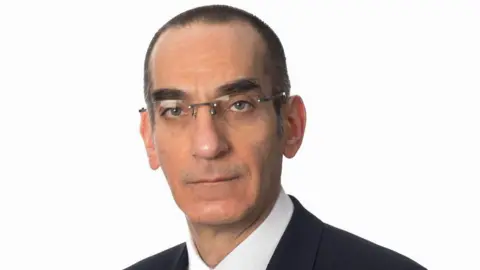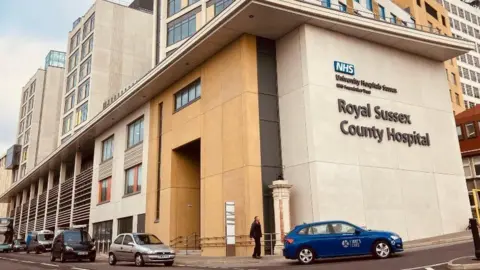Surgeon banned by private practice is working for NHS
 BBC
BBCA surgeon banned from working for a private healthcare company, following an investigation into patient safety, continues to work in the NHS, the BBC understands.
Nuffield Health has stopped Marc Lamah from working in their hospitals, but he is still operating on patients for the University Hospitals Sussex NHS Foundation Trust.
An NHS patient left with a twisted bowel following an operation he carried out said he should never work again.
Mr Lamah did not respond to the BBC's request for comment sent via his employer.
In January the BBC revealed concerns had been raised about Mr Lamah's complication rate and that he was no longer practising at Nuffield Health's hospital in Brighton pending an investigation.
A former employee at the hospital told the BBC that internal data showed one third of Mr Lamah's patients had experienced a "moderate harm event", where, for instance, a patient had to be transferred to another hospital or re-admitted, over a 12-month period. The figure should be 5%, the BBC was told.

In a statement to the BBC, Nuffield Health said following an independent investigation, "we can confirm Mr Lamah's practicing privileges with Nuffield Health have been withdrawn.
"His conduct did not meet the standards of medical practice and governance we expect. Patient safety is our top priority, and we hold all consultants to the highest standards."
Mr Lamah continues to operate as a colorectal surgeon at the Royal Sussex County Hospital in Brighton.
The University Hospitals Sussex NHS Trust, which runs the hospital, told the BBC it had audited Mr Lamah's NHS data, which showed his outcomes were within the expected national range. The trust added that Nuffield's investigation had found "no concerns with regard to technical abilities, surgical practice or patient safety".
The trust is at the centre of a large police investigation, Operation Bramber, looking into at least 200 cases of alleged medical negligence.
Sussex Police is examining concerns about avoidable harm and cover-ups in the trust's neurosurgery and general surgery departments between 2015 and 2021.
The trust runs seven hospitals across East and West Sussex and is one of the largest organisations within the NHS, providing care to a population of almost two million people.

Sheryl Hunter says she has suffered "five years of hell" after an NHS operation carried out by Mr Lamah. She has to manually excavate her bowels and has needed several emergency admissions.
After suffering from endometriosis for a number of years, in 2019 doctors decided that Ms Hunter, a mother of one, needed an operation to ease her pain.
Mr Lamah decided the best approach was to remove a part of her large intestine, the colon, and connect it to her small intestine.
A few days after she was discharged, said Ms Hunter, "I felt something pop, and this very awful fluid was coming out of me".
She was rushed back to the Royal Sussex where they discovered the joint between the two intestines had torn, and "for 10 days it had been filling up my abdomen with bowel matter."
This is a known complication of this type of surgery, the BBC understands.
Despite that problem being resolved, Ms Hunter continued to suffer extreme pain for several years, necessitating repeated visits to both her GP and the Royal Sussex hospital.
She said: "I have very little good days. By that, I mean I am curled up in a ball crying.
"When I try to go to the toilet, I scream on the toilet in tears because it is so painful to go, to open up my bowels. I have to manually do that, which means I have to wear gloves.
"The pain is very severe – it's in my stomach, it gets into my spine, down my legs, my arms."
Letters shared with the BBC by Ms Hunter show her GP wrote to Mr Lamah repeatedly requesting he see her again.
In January, 2023 the GP wrote that "we have written to you on multiple occasions to review her and discuss her options".
A few days later Mr Lamah replied to say he had not received any previous letters.
But almost 12 months later, in December 2023, the GP wrote another letter urging Mr Lamah to see her.
Ms Hunter told the BBC he was "begged" by colleagues to see her but "he refused".
Finally, in April 2024, she was seen by another consultant at a different hospital run by the same trust - the Princess Royal Hospital in Haywards Heath - when she found out what was causing her pain.
"The main problem is a 180 degree twist on the small bowel causing an internal hernia and twisting the anastomosis [the surgical joint]," said the discharge sheet given to Ms Hunter by the hospital after the procedure.
"When they did the reconnection [of the intestines], they put it on backwards," Sheryl said she was told.
"That [creates] a risk of rupture. If you rupture, it's a two-hour window before death.
"Had I not been manually opening my bowels for five years, they said that would have happened."
The trust said surgical error was only presented as one of a range of possibilities.
The BBC passed the details to an independent medical expert who said the twist "certainly is a consequence of the 2019 operation".
The trust said only a further operation would confirm if Mr Lamah had made an error or whether the twist had occurred naturally.
However, the damage is now more extensive than it would have been had Ms Hunter been treated earlier.
She has been told she will need pelvic reconstruction surgery before she can have another operation to try to fix her intestines. She is on a waiting list for the first procedure and has spoken to Sussex Police about her experience.
Former NHS colleagues have also raised concerns to the BBC about Mr Lamah, but he continues to practise at the Royal Sussex County Hospital.
"I think it's disgusting. That man shouldn't be allowed to touch any other patients," said Ms Hunter.
"I was told Marc Lamah has a terrible bedside manner, but he's a fantastic surgeon.
"Marc Lamar has a terrible bedside manner, and he's a terrible surgeon. He shouldn't be allowed to operate, as far as I'm concerned."
'Robust systems'
In a statement, Prof Katie Urch, chief medical officer for the University Hospitals Sussex NHS Foundation Trust, told the BBC: "We can't publicly discuss an individual's care, but we absolutely understand the distress and difficulty anyone living with ongoing complex health issues can face.
"Our clinical teams are dedicated to understanding their patients' needs and providing the highest standard of care.
"Whilst no medical procedure can guarantee a successful outcome, our teams strive for the best possible results every day – and if we ever have cause to think we could have done more for a patient we have robust systems, including the routine use of independent experts, to help us learn and improve."
Follow BBC Sussex on Facebook, on X, and on Instagram. Send your story ideas to [email protected] or WhatsApp us on 08081 002250.
